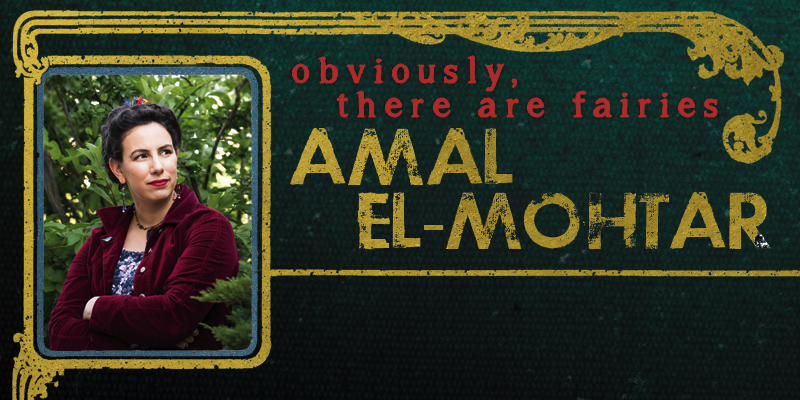Amal El-Mohtar: Obviously, There Are Fairies

AMAL EL-MOHTAR was born December 13, 1984 in Ottawa, Canada, and grew up there, apart from two years spent in Lebanon, where her family is from. She began publishing short fiction with “The Crow’s Caw” (2006) and has published scores of stories and poems, notably Hugo, Locus, and Nebula Award winner “Seasons of Glass and Iron” (2016, also a World Fantasy, Sturgeon Memorial, and Aurora Award finalist); Nebula Award finalists “The Green Book” (2010) and “Madeleine” (2015); World Fantasy Award finalists “Pockets” (2015) and “John Hollowback and the Witch” (2023); Locus Award winner “The Truth About Owls” (2014); and Rhysling Award winners “Song for An Ancient City” (2008), “Peach-Creamed Honey” (2010), and “Turning the Leaves” (2013). Some of her short fiction is collected in The Honey Month (2010).
She started editing poetry magazine Goblin Fruit with Jessica P. Wick in 2006, and in 2018 began writing the Otherworldly SF/fantasy column for the New York Times Book Review. In 2018 she was a host of the podcast Writing Excuses. She has taught at Carleton University (where she was working on a doctorate in English) and the University of Ottawa. El-Mohtar lives in Ottawa (and occasionally Glasgow) with husband Stu West, married in 2015.
El-Mohtar & Max Gladstone collaborated on the epistolary SF novella This Is How You Lose the Time War in 2019. The book was a genre success from the beginning, winning both Hugo and Nebula Awards, and in 2023 it broke through to the mainstream and became a New York Times bestseller after a post about the book by a social media user called “Bigolas Dickolas Wolfwood” went viral.
El-Mohtar’s latest work is fantasy novella The River Has Roots (2025).
Excerpt from the interview:
“The River Has Roots began life as novelette, and it was very explicitly supposed to be between 10,000 and 12,000 words, because it was originally commissioned as an Audible Original. They have a programmatic approach: ‘We want it to be roughly this long to listen to.’ I was like, ‘Great. I’m going to write a short story – a slightly longer short story than usual, but nevertheless a short story.’ I did, and it was about 10,000 to 12,000 words when I finished it and sent it in to the editor, who is lovely. We got through copyedits, but then for whatever reason they weren’t able to complete production, so they reverted the rights back to me.
“So my agent said, ‘Let’s send it to Ali Fisher at Tor.’ We did, and she loved it, and then she wanted it to be longer. When I wrote the novelette, I did so thinking, ‘I feel like there is more in this world, and there are more layers to the story that I could tell. Perhaps in a print version after the audio version appears, maybe I’ll come back and develop it into something longer.’ Then, all of a sudden, sudden, it was like, ‘No! I have to do that right now!’ It took a little while for the deal to happen because I thought we were selling a novella, and then they came back with, ‘Actually, what we want is to offer you a four-book deal, with this as part of it.’
“This incidentally happened within about a month of me being laid off from my first job in games. I cannot even begin to tell you – it was such a chaotic year, 2023. I got laid off at the end of March, and then by May seventh, the Bigolas Dickolas thing happened. So it was like, ‘I’ve been laid off, I’m going to live off unemployment money for the first time in my life, and I guess now is the time to be writing a novel, perhaps.’ Then, all of a sudden, it was, ‘Four-book deal! Viral stuff!’ And I was like, ‘Well, I’m definitely writing a novel now. It’ll have to be two novels in a specific amount of time.’ But it was all going to start with the novella so the first thing to do was to expand it.
“All that is to say it was written in two parts. I wrote it as a novelette first, and I liked the shape of the story there. In order to make it into a novella, I needed to add dimension to it. I remember saying to my editor that it felt like I was being asked to turn a scarf into a sweater, but all I knew how to do was to keep knitting more scarf, to just make the scarf longer and longer. This was the hardest revision I’ve ever done. I have never tried to change the nature of a story while trying to preserve the nature of the story, basically. I really wanted to keep all the things that I loved about the way that it was a novelette, but everything I tried to do to expand it felt like it was fundamentally changing the tone or the dynamics or the themes of the story. Trying to thread a needle to keep the things that I loved, while also adding things that I wanted to love in the same way and would fit with that, felt so hard. It was a very frustrating and difficult process that made me feel like I had never ever been a writer and had just never actually learned how to do anything with words.
“It really wasn’t until my husband said, ‘Why don’t you do the thing that you tell your students to do?’ I tell my students all the time to read their work out loud. I was like, ‘I guess I could read the whole thing out loud. It’s probably not going to help. That sounds dumb.’ I did, and it took a couple of hours, and I read it all out to Stu, and then I was like, ‘Huh. I guess I do know how to fix it.’
“I really love the shape that it has now, but I find that I’m still startled when I read it, because the new material still feels new. I still, on some level, have the earliest version of it in my head, so whenever I read the new stuff I’m like, ‘Whoa, did I write this? Huh. Okay. It’s not bad.’
“This whole process has been super atypical. Honestly, when I write short stories, every short story feels different in terms of process, in terms of what challenge I’m setting myself to do with the story. If any at all; sometimes I’m just writing a story because of vibes, and sometimes I have a really specific argument or project or question that I want to explore. The stories are often very different from each other.
“I say this about a lot of my short stories, but I do feel like this world, more than others, is one that I’d like to explore in a longer work. There is a lot of worldbuilding that I did for this story that is nowhere on the page. At some point, my editor was asking questions like, ‘Why does Rin say this thing in this place?’ And I was like, ‘Oh, obviously because of all this other worldbuilding that I guess I never put in the book?’ There is so much that I figured out for it, and it was just overkill because I’d never written a whole novella before – I don’t know how people do that. I quite seriously overdeveloped an engine for how the magic works in this world, which I don’t explore at all, because it’s not the story here; the story is about the sisters. I do know how the magic works and where it comes from, and I think there is, potentially, a novel in exploring those things. Whether or not that’s actually the next novel I write, I have no idea, but it is something I think about.
“I’m really heartened whenever I hear a novelist say, ‘You never learn how to write novels, you only learn how to write the novel that you’re currently working on,’ which I think a bunch of people have said some version of at this point. It is heartening to know that we’re all sort of muddling through, even as we acquire the skill and experience.
“Most books have very little in common with each other, generally speaking. As a critic, I feel like saying, ‘They are made of words and sometimes they exist between covers. That’s basically it.’ And we, as writers, are not the people putting them between covers.
Interview design by Francesca Myman
Read the full interview in the March 2025 issue of Locus.
 While you are here, please take a moment to support Locus with a one-time or recurring donation. We rely on reader donations to keep the magazine and site going, and would like to keep the site paywall free, but WE NEED YOUR FINANCIAL SUPPORT to continue quality coverage of the science fiction and fantasy field.
While you are here, please take a moment to support Locus with a one-time or recurring donation. We rely on reader donations to keep the magazine and site going, and would like to keep the site paywall free, but WE NEED YOUR FINANCIAL SUPPORT to continue quality coverage of the science fiction and fantasy field.
©Locus Magazine. Copyrighted material may not be republished without permission of LSFF.







